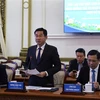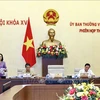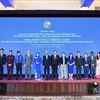Donors from the Global Facility for Disaster Reduction and Recovery (GFDRR) began their three-day visit to Vietnam on October 5 to look into the country’s preparedness to cope with natural disasters.
The donors from the GFDRR representing Finland, France, Japan, Luxembourg, Norway, Sweden, the United Kingdom, the European Commission, UNISDR, and the World Bank will meet with representatives from government agencies to discuss the impact of recent disasters in the region and ways to further support government initiatives on sustainable recovery and long-term reconstruction, the World Bank said in its press release on Oct. 5.
With the support of GFDRR, a strategy is being implemented in Asia , focusing on supporting country-led disaster risk management programmes and investments.
The GFDRR is actively engaging local authorities in strengthening its institutions for disaster risk management, introducing climate change and disaster resiliency in development planning, putting in place sustainable emergency preparedness, response and recovery, and developing adequate tools for catastrophe risk financing.
With GFDRR’s grant of about 1 million USD, the World Bank is working with the Vietnamese Government to integrate disaster risk reduction into ongoing development initiatives in the northern mountainous region.
The grant also covers improved drainage models for low-lying coastal cities, providing city managers with a tool to assess and improve their cities’ disaster preparedness, increasing communities’ awareness of and resilience to natural hazards, and providing an overview of current tools to finance disaster losses.
With GFDRR support, a consortium of government agencies, donors, and non-governmental organisations working in the field of disaster risk management have been involved in a communications programme on Community Based Disaster Risk Mitigation (CBDRM).
This helped encourage the Government to approve a new programme on community-based disaster risk management in July 2009. Accordingly, the Government’s new CBDRM programme is expected to reach over 10,000 communes nation-wide over the next decade.
The GFDRR is a partnership of 18 countries and three international organisations committed to helping disaster-prone developing countries and regions reduce their vulnerability to natural hazards and adapt to climate change.
The GFDRR promotes technical and financial assistance to low- and middle-income countries at high risk, based on a business model of support to mainstream disaster risk reduction in national development strategies and investments in anticipation of upcoming events, as well as disaster assistance after an event has occurred to ensure sustainable recovery.
GFDRR promotes global knowledge and good practices, supports initiatives for enhanced global and regional cooperation and promotes greater South-South cooperation in disaster risk reduction./.
The donors from the GFDRR representing Finland, France, Japan, Luxembourg, Norway, Sweden, the United Kingdom, the European Commission, UNISDR, and the World Bank will meet with representatives from government agencies to discuss the impact of recent disasters in the region and ways to further support government initiatives on sustainable recovery and long-term reconstruction, the World Bank said in its press release on Oct. 5.
With the support of GFDRR, a strategy is being implemented in Asia , focusing on supporting country-led disaster risk management programmes and investments.
The GFDRR is actively engaging local authorities in strengthening its institutions for disaster risk management, introducing climate change and disaster resiliency in development planning, putting in place sustainable emergency preparedness, response and recovery, and developing adequate tools for catastrophe risk financing.
With GFDRR’s grant of about 1 million USD, the World Bank is working with the Vietnamese Government to integrate disaster risk reduction into ongoing development initiatives in the northern mountainous region.
The grant also covers improved drainage models for low-lying coastal cities, providing city managers with a tool to assess and improve their cities’ disaster preparedness, increasing communities’ awareness of and resilience to natural hazards, and providing an overview of current tools to finance disaster losses.
With GFDRR support, a consortium of government agencies, donors, and non-governmental organisations working in the field of disaster risk management have been involved in a communications programme on Community Based Disaster Risk Mitigation (CBDRM).
This helped encourage the Government to approve a new programme on community-based disaster risk management in July 2009. Accordingly, the Government’s new CBDRM programme is expected to reach over 10,000 communes nation-wide over the next decade.
The GFDRR is a partnership of 18 countries and three international organisations committed to helping disaster-prone developing countries and regions reduce their vulnerability to natural hazards and adapt to climate change.
The GFDRR promotes technical and financial assistance to low- and middle-income countries at high risk, based on a business model of support to mainstream disaster risk reduction in national development strategies and investments in anticipation of upcoming events, as well as disaster assistance after an event has occurred to ensure sustainable recovery.
GFDRR promotes global knowledge and good practices, supports initiatives for enhanced global and regional cooperation and promotes greater South-South cooperation in disaster risk reduction./.



















